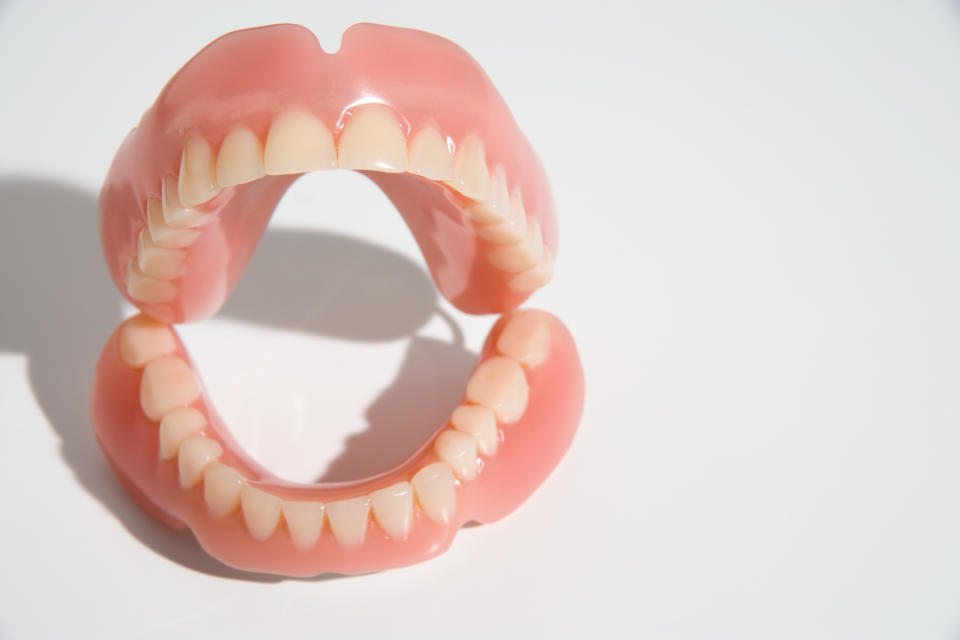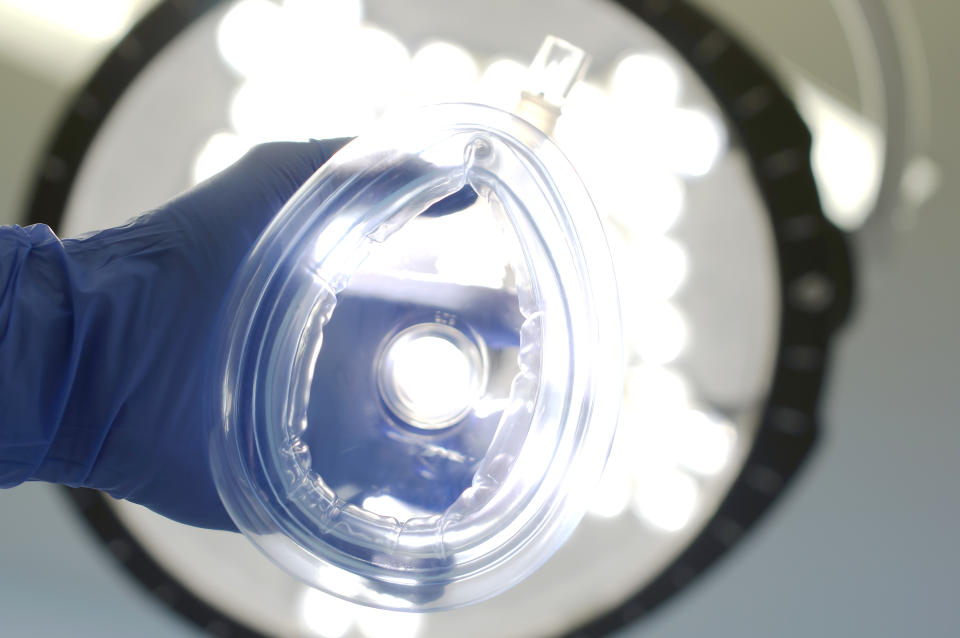What The Health?! Man's dentures found in throat a week after surgery
Can leftover spaghetti really kill you? Can you actually cough up a blood clot in the shape of your lung? In Yahoo Lifestyle Canada‘s newest series, What The Health?!, we ask doctors to weigh in on odd health news stories and set the record straight. Be sure to check back every Friday for the latest.

If you have dentures, loose teeth, bridges, or crowns and you have to have any kind of procedure requiring general anesthesia, you’ll want to let your docs know about them.
A 72-year-old British man recently swallowed his partial dentures during an abdominal operation, with the false teeth and metal roof plate ending up being stuck at the back of his throat for more than a week before they were found.
ALSO SEE: 'We are gutted': Couple issues warning after all three of their dogs die from toxic algae
According to the medical journal BMJ Case Reports, the man went in for surgery to have a benign lump in his abdomen removed. Six days later, he went to the emergency room because he was coughing up blood and having difficulty swallowing. He was diagnosed with pneumonia and sent home with antibiotics and steroids. However, his symptoms only worsened. Two days later, he went back. Another X-ray revealed that his dentures were lodged at the back of his larynx.

The man, who needed another surgery to have them removed, assumed that his dentures had simply gotten lost while he was in hospital.
The case is a cautionary tale for anyone needing anesthesia who has foreign objects in their mouth. Although rare, dentures, loose teeth, retainers, tongue piercings, bridges, and crowns can all cause problems when intubation is required.
Six other cases of dentures going astray as surgical patients were put to sleep have been documented. Usually, people sense something at the back of the throat soon after waking up.
ALSO SEE: What The Health?! Woman's arms and legs amputated due to infection from dog saliva
“If you go off to sleep and you have your dentures in, there’s always a risk they can come loose, and where they tend to migrate when you’re lying flat is the back of your throat,” says Dr. Daniel Bainbridge, president of the Canadian Anesthesiologists’ Society. “In general, we ask that they be removed as a mandatory requirement before undergoing anesthesia.”
Ensuring a patient’s dentures are out before anesthesia isn’t always straightforward, however. A lot of people don’t like having their dentures out because they’re uncomfortable being seen without teeth. Furthermore, it can be hard to properly enunciate words without teeth, so communication can become troublesome if dentures are out.

“We tend to allow them to leave their teeth in for as long as possible, but the standard treatment for anybody who has anything in the mouth that comes out is to take it out before you go to sleep,” says Bainbridge, who’s also a professor of anesthesia and perioperative medicine at Ontario’s London Health Sciences Centre. “It’s a patient safety issue.”
There are other reasons dentures can go astray during general anesthesia: some patients are so embarrassed by them that their family members don’t even know they have them, so doctors aren’t informed. Or people end up in the operating room in a state of confusion or disorientation and aren’t able to relay any information to the medical team.
ALSO SEE: Woman's birth control implant found in her lung: report
Besides the potential for oral devices becoming stuck in the throat, the reason anesthesiologists require their removal is because they can get damaged. When you’re put to sleep for surgery, you’re intubated with a metal device to help you breathe. “Most prosthetics—dentures, implants—aren’t as strong as teeth, and there’s a risk you can break them,” Bainbridge says.

Loose teeth can also pose a threat during anesthesia. If one gets knocked out, you can aspirate it, the tooth ending up in the lung, where it can lead to infection. “If you swallow a loose tooth it’s not a big deal, but getting it in your lung is,” Bainbridge says. “Ideally, you’d have loose teeth pulled before you go off to sleep but that’s not always possible. We like to know where your loose teeth are so that we can make sure they haven’t come out during the conduct of anesthesia.”
ALSO SEE: What The Health?! Can you really go blind from showering with contacts in?
Even chewing gum can be problematic. If a piece of gum is in a patient’s mouth before and during anesthesia and surgery, it can end up being aspirated. “When you go off to sleep, you lose the protective airway reflex,” Bainbridge explains. “So if something goes into the lung, instead of [a patient] coughing it out, it falls into the lung, and there’s a risk of infection and pneumonia.”
Bainbridge suggests people with dentures or other oral devices let their health-care provider know even if they’re having a procedure that calls for mild sedation. There’s a possibility that people could end up requiring deep sedation or general anesthesia. “Always have them removed for safety,” he says.
Let us know what you think by commenting below and tweeting @YahooStyleCA! Follow us on Twitter and Instagram.



